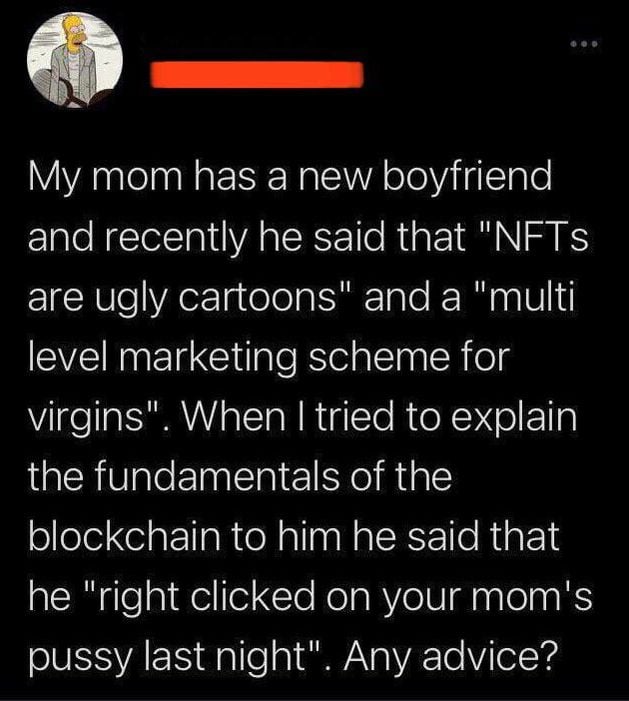this post was submitted on 13 Nov 2024
917 points (98.3% liked)
People Twitter
5220 readers
2109 users here now
People tweeting stuff. We allow tweets from anyone.
RULES:
- Mark NSFW content.
- No doxxing people.
- Must be a tweet or similar
- No bullying or international politcs
- Be excellent to each other.
founded 1 year ago
MODERATORS
you are viewing a single comment's thread
view the rest of the comments
view the rest of the comments

I’ve read that blockchain itself is a good technology. NFTs are a laughably absurd attempt to exploit that technology for profit.
Xitter op needs to shut up.
It's one of those things where scientists discovered something interesting and novel, and then a bunch of dumb grifters came in to try and make it their new snake oil.
A very, very long time ago, back when Bitcoin was viewed as a currency instead of an "investment" platform, Bitcoin kinda fulfilled the ideal use case for the blockchain. I think now the general public is just too soured on them for that to ever be the case, unless Elon makes Bitcoin the new currency of the U.S...
I seriously think his plan is fuck up the US economy so bad that the dollar hyperinflates.
Blockchain is a solution in search of a problem. A way to establish trust while not trusting any party is a cool concept, but in the real world it's far easier to establish a source of trust.
It is a bad solution though, because it revolves around wasting tons of energy in solving made up problems no one actually needs the solution to. I know there's alternative cryptocurrency that use better methods or solve actual problems but 90% of it is bitcoin.
Congratulations, now your trust relies on your subject never becoming important enough that someone bothers to run 50%+1 of the nodes in your network which means only very, very large subjects (or ones where trust wasn't very important in the first place) ever even have a chance of that not happening. What do you say? Your technology doesn't scale to very, very large subjects because of abysmal transaction rates?
Yup. Very well said. People don't realize the extent of wealth inequality (and how ridiculously resource intensive blockchain tech is). If anything important were to be decide by a blockchain, the top 1% would control the network.
More on wealth inequality here.
Today's inequality was created by the Cantillon effect.
What happened in 1972?
What problem does blockchain solve?
Having too much electricity and not enough CO2.
We recently developed AI for that purpose though which does the same thing but is useless in occasionally funny ways.
Apparently, it can be very secure. If “pieces” of a secure key are stored in multiple places, for example, only changing one link in the “chain” means it won’t match with the others. They ALL have to be changed at the same time, which is virtually impossible to do in secret.
Please note that I am far from an expert on the subject. I’m paraphrasing an article I read months ago.
Can’t you takeover a blockchain by owning the majority of a block chain, or by having a majority of the processing power to compute hashes?
Yes which is part of why the major chains are owned and controlled by companies, but then that makes the whole thing pointless. IMO, a company controlled blockchain may as well just be a DB cluster, it would be faster and more efficient.
Essentially, verifiability (the token exists on the blockchain), de-duplication (each token can only exist once on the blockchain), and proof of ownership (only one account number can be associated with each token on the blockchain). There's nothing wrong with this idea in a technical sense and it could be useful for some things.
But... the transaction process is computationally expensive. For the transaction to be trustworthy, many nodes on the blockchain network must process the same transaction, which creates a whole bunch of issues around network scaling and majority control and real-world resource usage (electricity, computer hardware, network infrastructure, cooling, etc).
And beyond that, the nature of society and economics created a community around this unregulated financial market that was filled with... well, exactly the kind of people you'd expect would be most interested in an unregulated financial market - scammers, speculative investors, thieves, illegal bankers, exploitatitive gambling operators, money launderers, and criminals looking to get paid without the government noticing.
The technology can solve some interesting problems around verifying that a particular digital file is unique/original (which can be useful, because it's extremely easy to make copies of digital information) but it creates a long list of other problems as a side effect.
Almost every single non-theoretical problem that blockchains solve is something we've already solved. And most of the problems you could solve with a blockchains are severely limited by data-size limitations.
It would be amazing if I could decentrally store, say, a movie or videogame on a blockchain. Then, I could sell access tokens, would the owners could resell as they wanted. That's a GREAT way to use blockchain tech, because people would always have access, and they could use or sell the keys as they wanted. It doens't work though, because in the real world, that movie doesn't fit on the blockchain, it'll just be a link the a secondary source, and the whole thing falls apart.
And that's really the problem. Blockchains have a lot of nifty uses, but it almost always immediately falls apart around the edges, where it touches on non-blockchain tech, or, even worse, physical objects.